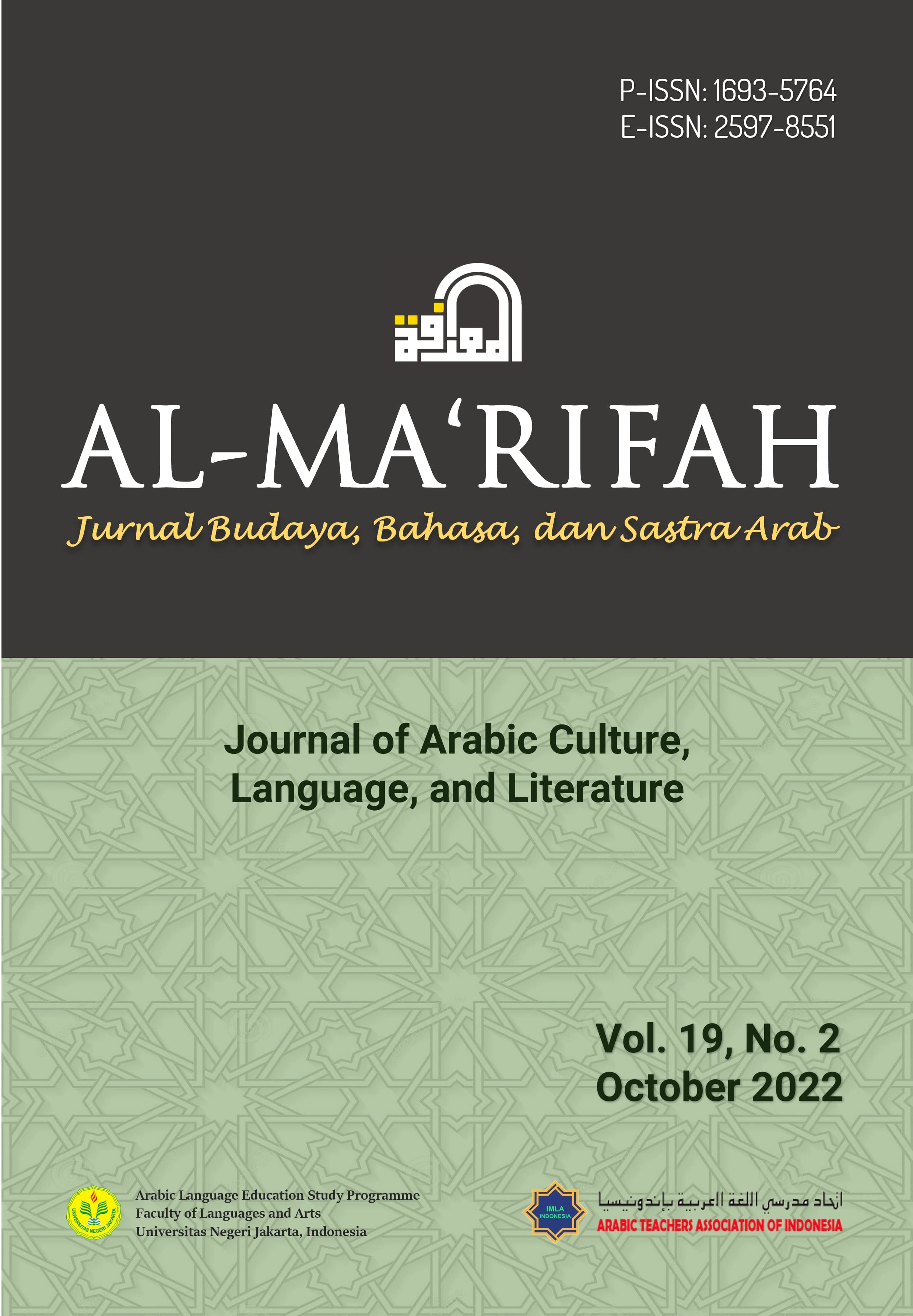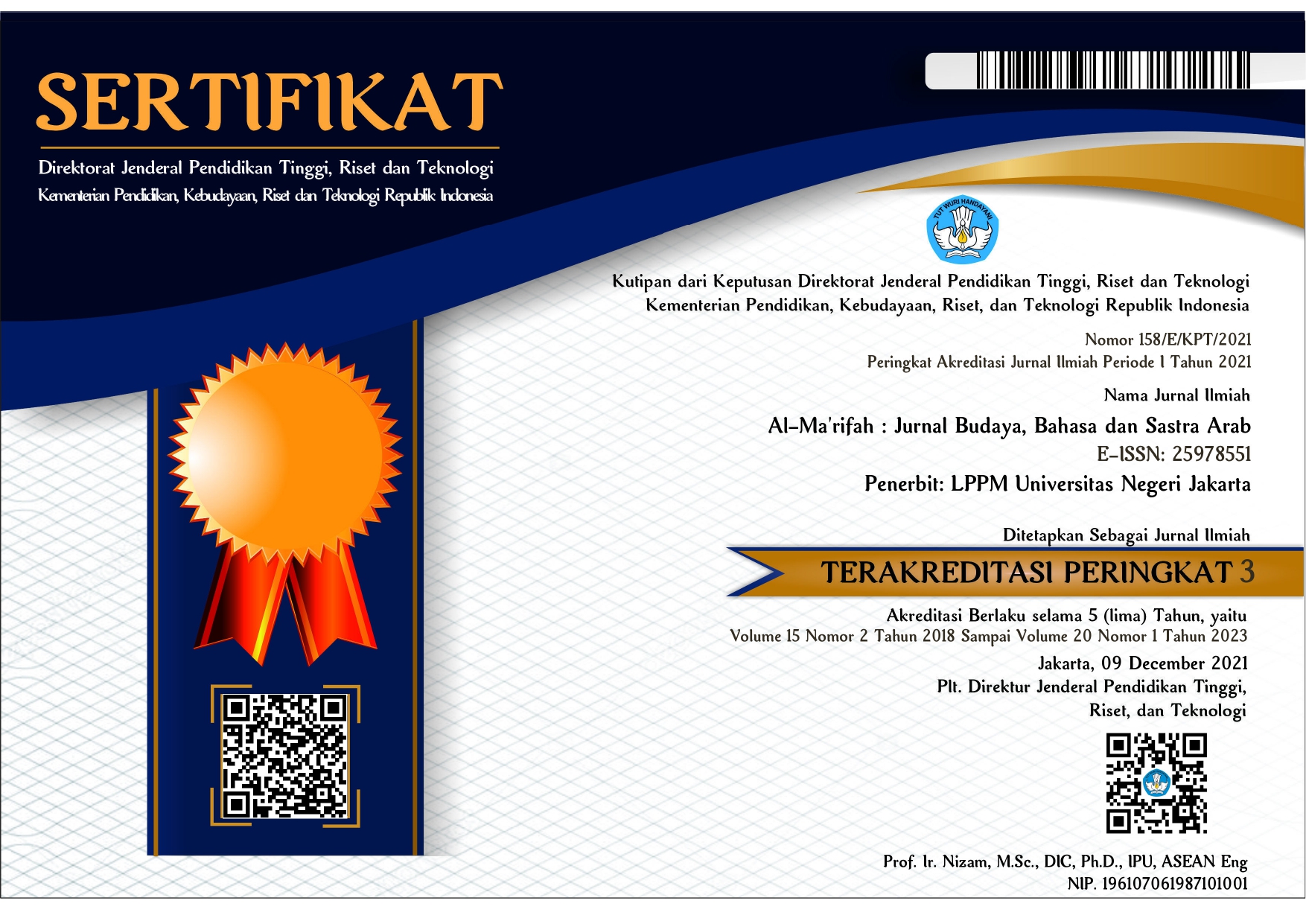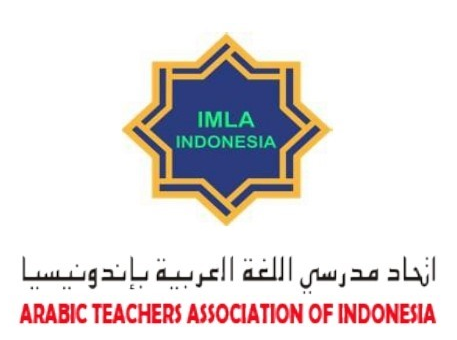Storytelling Poetry in the Poems of ‘Alī ibn al-Jahm and the Ode of the Creation of Adam
DOI:
https://doi.org/10.21009/almakrifah.19.02.06Keywords:
Storytelling poetry, ‘Alī ibn al-Jahm, Abbasid era, creation of AdamAbstract
Story poetry as a branch of the big tree of poetry and literature in Abbasid era, is one of the important tools for discovering historical facts. This study showed that ‘Alī ibn al-Jahm can be considered one of the pioneers of this literary art in the Abbasid era. He paved the way for poets to depict history in this format and create novel works in this era and immortalize those historical events. By analyzing each element of the story in ‘Alī ibn al-Jahm’s chapter “Creation of Adam”, this study has proved that this work is a story poem and also tries to determine the poet’s goals from the order of this work for the audience. The results of this study show that the aim of ‘Alī ibn al-Jahm in this poem is to teach the teachings of Islam to the audience and people of his time in addition to retelling the events and history of the prophets. Considering that ‘Alī ibn al-Jahm was a court poet and praiser of the caliphs of Banī ‘Abbās, probably the aim of the poet is also to teach a lesson from the caliphs and also the behavior of the prophets and the ancients.
References
The Holy Quran.
Abbott, H. P. (2008). The Cambridge introduction to narrative (2nd ed.). New York: Cambridge University Press.
Abdul Kadir, M. S. (2020). Athar al-shi‘r fī tadwīn al-aḥdāth al-tārīkhīyah fī al-qarn al-tāsi‘ ‘ashar: Qaṣīdat al-Shaykh Muhammadu Bello ibn al-Shaykh Usman ibn Fodio fī ghazwat Kano unmūdhajān. Al-Ma’rifah: Jurnal Budaya, Bahasa, dan Sastra Arab, 17(1), 87–97. doi:10.21009/almakrifah.17.01.09
‘Alī ibn al-Jahm. (n.d.). Dīwān ‘Alī ibn al-Jahm. al-Mamlakah al-‘Arabīyah al-Su‘ūdīyah: Wizārat al-Ma‘ārīf, al-Maktabāt al-Madrasīyah.
Baḥrāwī, Ḥ. (1990). Bunyat al-shakl al-ruwā’ī: al-Faḍā’, al-zaman, al-shakhṣīyah. Beirut: al-Markaz al-Thaqāfī al-‘Arabī.
Dad, S. (2008). Dictionary of literary terms. Tehran: Morvarid.
Ḍayf, Sh. (n.d.). Tārīkh al-adab al-‘Arabī: al-‘Aṣr al-‘Abbāsī al-awwal. Cairo: Dār al-Ma‘ārif.
Falaki, M. (2003), Story naration: Basic story theories of storytelling. Tehran: Bazetab Negar.
Ghaderi, N. (2001). Anatoly and the structure of drama. Tehran: Neyestan Book.
Hosseini, S. M. (2009). An introduction to the poems of educational poetry of the Abbasid era. Journal of Literature and Humanities Shahid Bahonar College, 25, 33–53.
al-Iṣfahānī, A. F. (2008). Kitāb al-aghānī (I. ‘Abbās, I. al-Sa‘āfīn, & B. ‘Abbās, Taḥqīq., Vol. 10). Beirut: Dār Ṣādir.
Javaher, M. (1993). A Look at the Contemporary Arab Story. Tehran: Bicha, Bita.
Masoudi, A. (1995). Promoters of gold. (A. Payende, Trans.). Tehran: Scientific and Cultural Publications.
Mirsadeghi, J. (2001). Elements of the story (8th ed.). Tehran: Sokhan.
Mohammadi, M. H. (1999). Methodology of criticism of children’s literature. Tehran: Soroush.
Najm, M. Y. (1955). Fann al-qiṣṣah. Beirut: Dār Bayrūt li-al-Ṭibā‘ah wa-al-Nashr.
Salem, M. (2015). Explaining the ontological and epistemological position of causality from the perspective of Aristotle and Ibn Sina. Quarterly Journal of Philosophy and Theology of Islam, the Mirror of Knowledge, Shahid Beheshti University, 5446, 27–51.
Sharifi, H. (2010). A new approach to the emergence of the educational order in Arabic literature Abbasid era. Journal of Literary Criticism Studies (Literary Research), Islamic Azad University of Central Tehran, 21, 183–203.
Soleimani, M. (1995). The art of storytelling (3rd ed.). Tehran: Amirkabir.
al-Shāfi‘ī. al-Umm (M. Z. al-Najjār, Taḥqīq., Vol. 1). Cairo: Maktabat al-Kulliyāt al-Azharīyah.
al-Tabarsī, F. (2005). Majma‘ al-bayān fī tafsīr al-Qur’ān (Vol. 2). Beirut: Dār al-Murtaḍá.
Younesi, E. (1976). The art of storytelling. Tehran: Amirkabir.
Zoodranj, S. (2001). Investigation and analysis of the role and position of Najib Al-Kilani in contemporary Islamic fiction writing: Tehran: Tarbiat Modares University.
Downloads
Published
How to Cite
Issue
Section
License
Copyright (c) 2022 Tayebeh Seifi, Zahra Mirzaei Hotkani, Masoumeh Seifuri

This work is licensed under a Creative Commons Attribution 4.0 International License.











